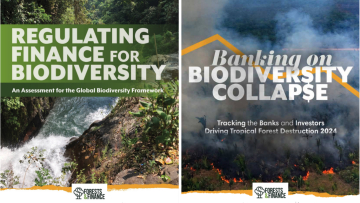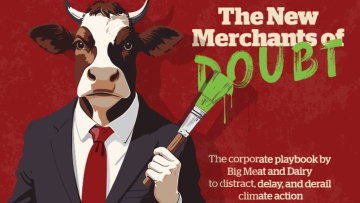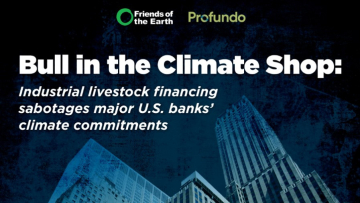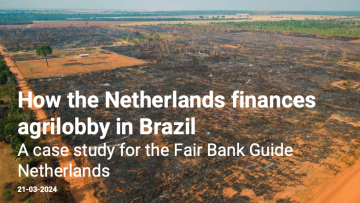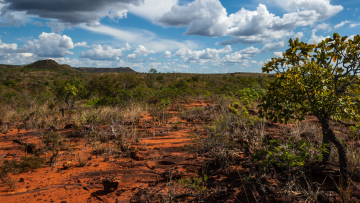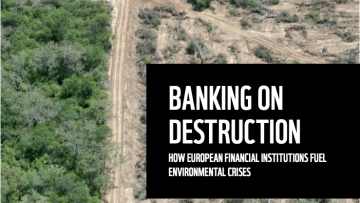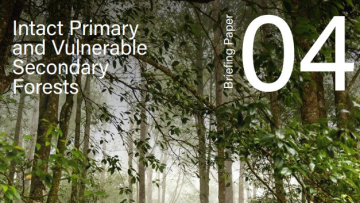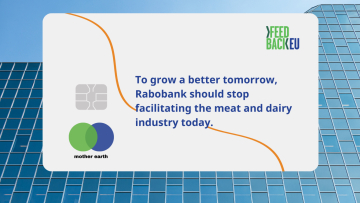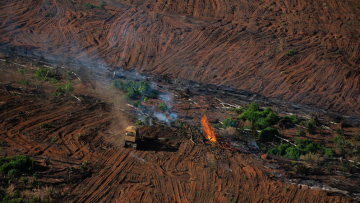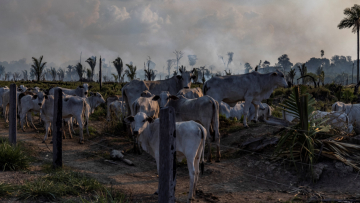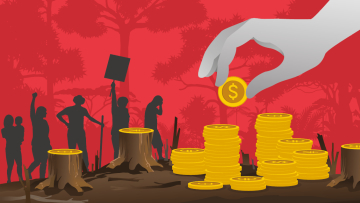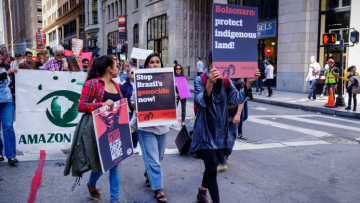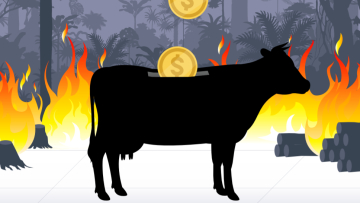
Company – On record
This profile is no longer actively maintained, with the information now possibly out of dateBankTrack,Amazon Watch,Imazon & Profundo
nature@banktrack.org
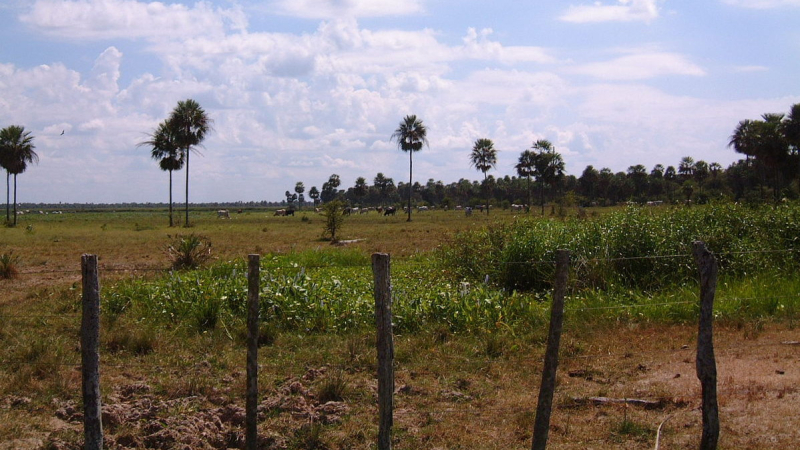
Company – On record
This profile is no longer actively maintained, with the information now possibly out of dateBankTrack,Amazon Watch,Imazon & Profundo
nature@banktrack.org
Why this profile?
Minerva has major operations in the Amazon rainforest, where together with Marfrig and JBS it accounts for around 70% of all cattle slaughtered, and the company has been found to be potentially buying cattle from almost one million hectares of land at risk of deforestation. Minerva also operates slaughterhouses in the world's most biodiverse savannah, Brazil's Cerrado Biome. Despite previous commitments to zero-deforestation, it still does not have a system for monitoring secondary and tertiary cattle suppliers, meaning it does not exclude suppliers that continue to clear forests, use slave labour or invade indigenous lands and other protected areas.
What must happen
Banks should not renew or take on new financing agreements with Minerva until and unless it fully eliminates deforestation and land rights abuses from its entire supply chain, as the company is highly implicated in deforestation in the Amazon.
| Sectors | Industrial Livestock Production , Agriculture for Biofuels, Agriculture for Food Crops |
| Headquarters |
|
| Ownership |
The principal holders of Minerva outstanding common shares are SALIC (UK) Limited (30.55%), VDQ Holdings S.A. (22.36%),Compass Group (5.46%), Minerva S.A. (3.68%), and others (free float) account for 37.95%. More details here. |
| Subsidiaries |
Companhia Sul Americana de Pecuaria S.A. – - international -
Frigomerc – Paraguay Minerva Dawn Farms Industria e Comercio de Proteinas SA – Brazil |
| Website | https://www.minervafoods.com/ |
Minerva Foods is a Brazilian livestock company and one of the largest South American companies involved in the production of beef and its by-products, meat processing, and cattle export. The company operates 25 cattle slaughterhouses across Brazil, Paraguay, Argentina, Uruguay and Colombia with a combined slaughter capacity of 29,350 heads of cattle per day. It also operates four sheep slaughterhouses in Australia and three processing units in Brazil and Argentina. Minerva is Brazil's second-largest beef exporter (behind JBS), exporting largely to the US and Europe.
Impact on human rights and communities
Labor issues: The cattle industry in the Chaco region of Paraguay, where a great part of Minerva’s cattle is sourced from, has been linked to reports of slave labour, child labour, and encroachment into indigenous lands, including by the UN Human Rights Council. The growth of beef production in the Paraguayan Chaco over the past years has been based on the exploitation of indigenous workers. Minerva has a Paraguayan subsidiary, Frigomerc, which owns an export-oriented slaughterhouse in the Chaco. The company's commitments with regard to slave labour, violence, and invasion of indigenous territories only apply to production from Brazil. None of the five top exporter groups in 2018 in Paraguay, including Minerva, had made any public commitment to eliminate forced labour and child labour from their supply chains.
In 2021, research by Repórter Brazil found that Minerva’s meatpacking plant in Araguaína, Brazil bought cattle from a direct supplier which sourced part of its animals from the “4 de Outubro farm”. This farm was involved in a case of slave labour in 2017 and later included in the “dirty list” of slave labour created by the federal government. Minerva Foods told Repórter Brazil that they have “never done business with the 4 de Outubro farm” and that no irregularities could be found in the process of supplying livestock to its unit in Arguaína. However, given the findings of Repórter Brazil’s investigation, this shows the inadequacy of Minerva’s surveillance systems.
Impact on climate
Largely driven by the cattle industry, deforestation in Latin America reduces the capacity of rainforests to absorb carbon dioxide from the atmosphere and to act as carbon sinks, which would help reduce the impacts of global greenhouse gas emissions. The Brazilian Amazon, in which Minerva operates several of its slaughterhouses, has been so impacted that some portions of it may already be releasing more carbon than they store.
Wildfires are more frequent in recently deforested areas, and the use of fire for land clearing further contributes to global CO2 emissions. The cattle industry plays a major role in these processes, as fire is used to open space for profitable cattle-ranching. The deforestation caused by cattle ranching is collectively responsible for the release of 340 million tons of carbon each year, equivalent to 3.4% of current global emissions.
Impact on nature and environment
Deforestation: In the Amazon alone, 80% of current destruction is driven by the cattle sector. The rainforest is deliberately cleared so the cows can be raised in the region, and deforestation reached 16% of the total area of the Legal Amazon in 2020. Furthermore, cattle pastures also degrade riparian and aquatic ecosystems, causing soil erosion, river siltation and contamination with organic matter. In the Brazilian Amazon, there are around 85 million cows, the equivalent to approximately four cows per inhabitant in the region.
In 2009, Minerva signed a legally binding settlement agreement (Term of Conduct Adjustment - TAC) with the Federal Prosecutors Office commiting not to source cattle from areas associated with deforestation ("Minimum Criteria for operations with cattle and bovine products on an industrial scale in the Amazon biome"). The company also responded to an investigation by Greenpeace on the link between deforestation and cattle farming in the Amazon with a zero deforestation commitment called the Cattle Agreement. Although Minerva has committed to measures for forest protection, the company still fails on their zero deforestation pledges.
A study published in 2017 by the NGO Imazon found that Minerva's Amazon slaughterhouses could be buying cattle from almost one million hectares of land at risk of deforestation, areas embargoed by the Brazilian Institute of Environment and Renewable Natural Resources (IBAMA), and areas deforested between 2010 and 2015. According to the same study, the company figures in the 10th place in the ranking of 81 companies in terms of exposure to three risks associated with deforestation in their potential buying zones in the Brazilian Amazon in 2016. It has identified 931,000 hectares with some type of risk in the potential buying zones of Minerva’s Amazon plants.
According to Greenpeace, in 2018 Minerva sourced cattle from Fazenda Rio Branco for a total of R$1.3m (£222,000). Chaules Pozzebon, the farm’s owner, is a Brazilian businessman accused of keeping workers in slave-like conditions, environmental harm, deforestation, and commerce of illegal timber. Several embargoes and fines for deforestation were recorded by Ibama under his name between 2006 and April 2022. Pozzebon was eventually sentenced, in June 2021, to 99 years in prison for leading a criminal gang.
Furthermore, another Greenpeace report (2020) has found that Minerva indirectly sourced cattle from farms that deforested a unique and biodiverse protected Amazon reserve, the Sierra Ricardo Franco Park, in Brazil’s state of Mato Grosso, on the border with Bolivia. State prosecutors said that since the park was created in 1997, the region where three farms in Sierra Ricardo Franco Park are located (Paredão I, Paredão II, and Cachoeira) were cleared, with thousands of hectares illegally deforested.
Minerva has bought cattle from a farm outside the reserve (Barra Mansa farm) that had sourced livestock from two farms inside it (Paredão I and Paredão II). For Minerva in Mirassol D’Oeste, Barra Mansa sold at least 2,000 animals between August 2018 and June 2019, showing that the company had its supply chain contaminated by deforestation and cattle ranching within a conservation area. During the same time, Minerva’s meat packing plant in Mirassol d’Oeste exported 18,625 tons of beef products worth more than $ 100 million, of which 12.5% went to the EU including Denmark, Germany, Italy, the Netherlands, Spain and the United Kingdom, based on shipping data based on export documents. The owner or part owner of the Paredão farms was charged with environmental crimes inside the 159,000-hectare reserve.
In Brazil, Minerva also operates slaughterhouses in the world's most biodiverse Savannah, the Cerrado Biome. The company has slaughterhouses in the Matopiba region (Maranhão, Tocantins, Piauí and Bahia), the agricultural frontier area of the Cerrado.
In Bolivia, a 2021 investigation by the Environmental Investigation Agency found Minerva to be a buyer of illegally raised cattle, coming from illegally deforested areas and helping to support armed groups through forced payments.
Furthermore, Minerva sources much of its beef from the Gran Chaco region, in Paraguay, which has been experiencing intensive deforestation largely due to cattle ranching. Between 2010 and 2018, the Paraguayan part of the Chaco biome lost more than 2 million hectares of native vegetation, largely due to the expansion of cattle pasture. The Dry Chaco region particularly has seen some of the highest rates of deforestation worldwide in the past decade. Minerva’s Paraguayan subsidiary, Frigomerc, owns an export-oriented slaughterhouse on the edge of the Chaco. According to the platform Trase, the group accounts for almost half of Paraguayan cattle trade volumes and its exports were responsible for almost 70% of all cattle deforestation risk among Paraguayan exporters in 2018. Despite this, the company’s deforestation-free commitments only apply to the Amazon biome, meaning that it is not adequately addressing the risks in other countries or forest ecosystems.
Irregularity and lack of transparency in the supply chains: Since 2014, Minerva has made public the results of independent audits made to test their systems for purchasing cattle from the direct supplying ranches in the Amazon biome. The 2016 audits found that Minerva does not adopt any system for verifying the indirect suppliers (breeding and rearing ranches that sell to the fattening ranches).
By 2018, Minerva had four slaughterhouses in the Amazon where they should implement the TAC restrictions. In the same year, the Amazonian state of Pará published an audit of Minerva and other companies, which found that the company reached compliance of 99.7% regarding direct suppliers. However, an independent audit again noted that Minerva does not have any monitorable and verifiable traceability system for its indirect suppliers to monitor all cattle purchases in the Amazon biome, including the supply chain links preceding the fattening ranches that supply to the slaughterhouses.
Authorities of the Federal Prosecutor Office in the Amazonian state of Pará have stated that there are no companies buying cattle from the Brazilian Amazon that are able to affirm their supply chain is deforestation-free. In fact, their systems for supply chain monitoring rely on official documents that can be susceptible to fraud, and on data provided by cattle ranchers themselves, who may have little interest in reporting compromising information.
Impact on pandemics
Changes in ecosystems increase interactions between animal species that would otherwise not get in close contact. As the cattle industry drives deforestation in Latin America, pastures and ranches push human encroachment onto natural resources.
In the Amazon rainforest in particular, deforestation and fires set animals on the move to find new livable habitats. They relocate, bringing along pathogens and the risk of disease spillovers between species. Cattle ranching nearby or within the Amazon, as well as land clearing for further expansion, is a major factor of risk for the emergence of zoonotic diseases. Domestic cattle can even act as a bridge for viruses between wildlife and humans. By operating slaughterhouses in the Brazilian Amazon and Paraguayan Chaco, Minerva contributes to increasing this risk.
According to researchers at the Oswaldo Cruz Foundation, a Brazilian public health institute, a strong disease risk has been identified in converting Amazonian forest into pastures and fields as these land uses attract marsupials and rodents, carriers of hantaviruses. In Brazil, the recent emergence of such viruses, among others, has been a clear warning of the dangers of the expansion of anthropogenic activities in the rainforest.


